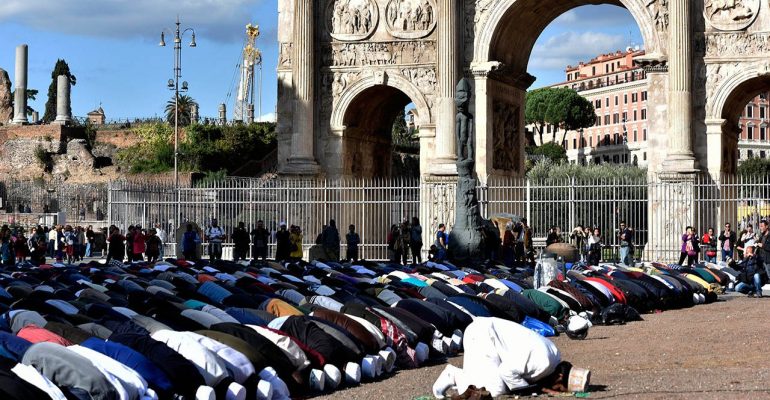Italian law sparks outcry as Muslims prayer spaces face threat of closure
June 26, 2023 2024-01-21 12:54Italian law sparks outcry as Muslims prayer spaces face threat of closure

Italian law sparks outcry as Muslims prayer spaces face threat of closure
A controversial law proposed by the ruling far-right coalition has brought Muslims and their places of worship to the forefront of Italy’s political discourse once again.
Italy’s Muslim community, consisting of approximately 2.5 million people, is deeply concerned about the potential repercussions of this law. If passed, the law could shut down hundreds of Islamic prayer spaces.
According to a 2017 report by the Union of Islamic Communities and Organizations in Italy, the country currently has 1,217 Muslim prayer spaces.
Of these, only six are officially recognized mosques, while about 50 others have obtained authorization for religious activities.
The remaining spaces predominantly situated in garages, warehouses, apartments, and basements, are classified as cultural associations but are also used for prayers.
Presented by Prime Minister Giorgia Meloni’s Brothers of Italy party, the bill will target these prayer spaces that are neither in mosques nor have received formal approval to be used for worship, such as the premises of various Muslim cultural organizations.
They argue that these places fail to meet urbanity, structural, and safety requirements, citing a proliferation of social promotion associations over the past decade that allegedly manage worship spaces without adhering to necessary regulations.
However, opponents vehemently oppose the proposed law, condemning it as discriminatory and a violation of religious freedom.
Securing authorization for constructing formal mosques has always been a protracted and costly process in Italy.
Local opposition and bureaucratic hurdles have frequently stalled mosque construction projects across the country, leaving Muslim communities with little choice but to establish cultural centers for prayers.
These centers also serve as vital community spaces, offering educational programs on Arabic language and Quranic studies.
Critics argue that the potential closure of over 1,000 associations under the proposed law disregards the importance of these community centers and the services they provide.
Moreover, they stress the need for a viable alternative that respects the religious practices and dignity of the Muslim community.
Muslim leaders and experts express their willingness to collaborate with Italian authorities to find a mutually agreeable solution.
As the draft law undergoes debate in the Chamber of Deputies, the lower house of Parliament, the future of Muslim prayer spaces remains uncertain.
The decision will not only impact the religious freedoms of Italy’s Muslim community but also shape the larger narrative surrounding religious inclusivity and tolerance in the country.
Source: ShiaWaves








